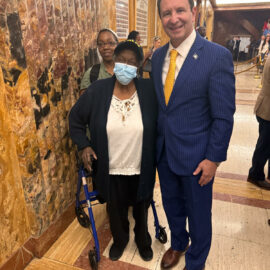
Louisiana, red state with a democratic governor. The governor wants the state to go carbon neutral. This is a surprise, but a welcome one.
Louisiana’s economy has long relied on the production of oil, gas and petrochemicals. But in a major shift, officials are looking to dramatically reduce the fossil fuel emissions that disproportionately ravage the state with powerful hurricanes, intense floods, rising seas and extreme heat. “Taking action to address climate change can strengthen our communities and our economy,” said Democratic Gov. John Bel Edwards last week in a statement announcing his plan to join the U.S. Climate Alliance. It follows an executive order late last year setting a goal of making Louisiana carbon-neutral by 2050. “Our kids are counting on us,” Edwards said at the inaugural meeting of his Climate Initiatives Task Force. “If anyone can identify innovative and sustainable solutions for our future, it’s Louisiana.” The move would put Louisiana in line with President Biden’s ambitious climate target for the entire country, and what scientists say is needed globally to avoid the most catastrophic consequences of the warming climate. But it’s not clear how Louisiana could achieve that, or if Edwards can overcome political and industry pushback.
npr.org
Louisiana is the fifth largest oil producing state. The legislature is pro-oil and chemicals. Tax cuts and favoritism for the petrochemical industry has made it hare for renewables to take hold.
Now, the climate commission will explore the potential for electric cars, mass transit, solar power and offshore wind turbines in the Gulf of Mexico. It includes scientists, state administrators, academics, oil industry representatives and environmental advocates. “It’s the first time any Louisiana governor has put the words ‘climate initiative’ and ‘task force’ together in one sentence,” says Monique Harden, policy expert with the Deep South Center for Environmental Justice. “That is a major, historic step forward.” Harden hopes that investing in clean energy creates more jobs, especially in communities of color, and reduces pollution in low income areas. “We can actually generate energy ourselves in a way that doesn’t have these harmful environmental climate effects,” she says.
In a way, this desire for becoming carbon neutral is happening now. Shell Oil is closing a major refinery. Oil is becoming less of the monies the state is bringing in, it is at 20% now down from 40% in the 1980’s. Biofuel companies are working in northern Louisiana. Some fossil fuel groups even have admitted the loss of oil and the increase in renewables.
Noemie Tilghman of Deloitte Consulting says the winners in a new marketplace dominated by renewables will be the companies, and states, that can diversify. “Those who choose to ignore it, and just believe the cycle will simply work itself out will be the losers,” she says. Daniel Autin once assumed he’d have a lifelong career in oil and gas. Since losing his job five years ago, he’s wondered if he should have done something differently to stay in it. But now, “you look at things from the big picture,” he says, “and you realize that you were probably lucky to have your job as long as you did.”
Even with the Governor’s support, shifting to renewables is still a hard sell in the state.
“You don’t necessarily need to choose between energy production and being carbon neutral,” says Tyler Gray, president of the Louisiana Mid-Continent Oil and Gas Association, and a member of the new climate commission. Gray says despite generous tax incentives and a history of industry-friendly policy, the state needs to do more to protect oil and gas. He and other advocates are lobbying for a slow transition away from fossil fuels, and more mitigating technologies — like carbon capture — to reduce emissions from refineries while allowing them to keep operating. Edwards seems to be walking that same fine line. He’s scolded Biden over his oil drilling moratorium, and says the fossil fuel industry is “not going anywhere. I suspect that we have decades left.” It’s also not at all clear that his zero-carbon goal includes the oil and gas that Louisiana exports. Plus, he’ll need to convince a Republican legislature full of pro-oil and gas lawmakers to embrace clean energy.
Now only 4% of Louisiana’s energy comes from renewables. There is a lot of room for improvement. The state climate task force will be submitting recommendations later this year. There will have to be a balance between oil and renewables and that may be a hard sell to the legislature.
I thank Peter for posting this so I could make this submission.



